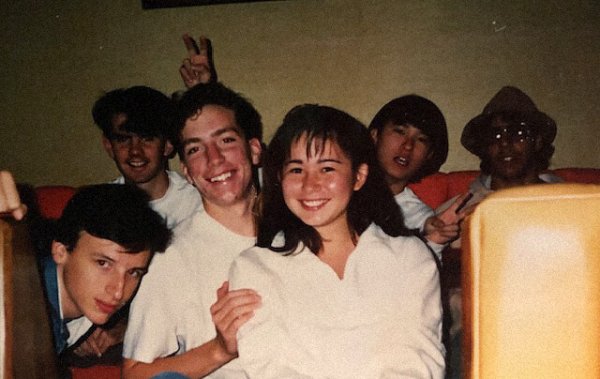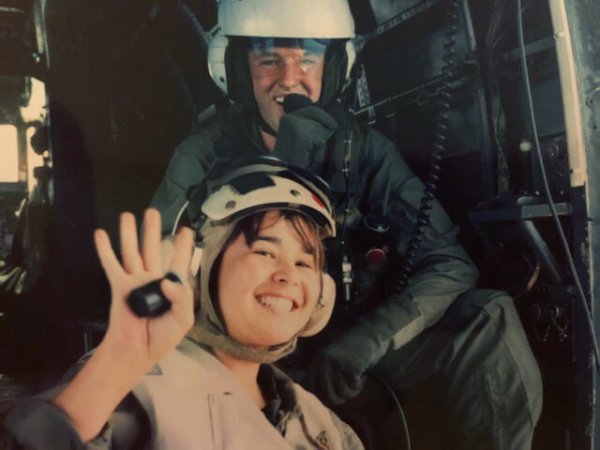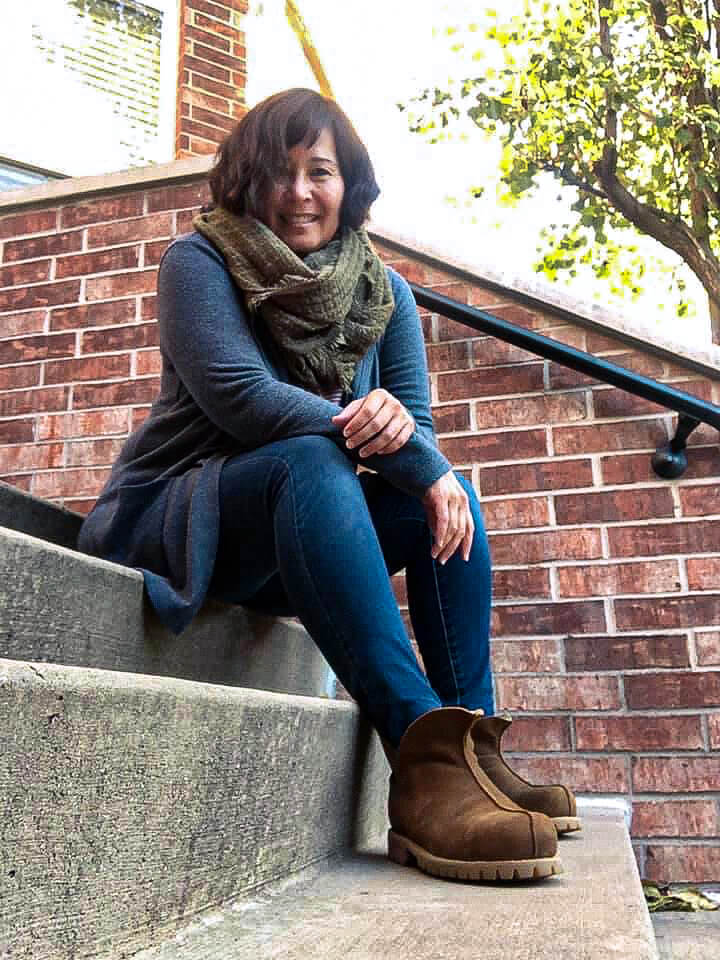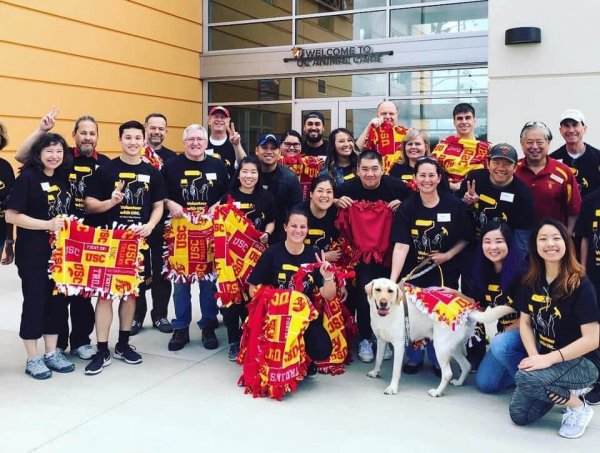Gains and Gratitude: Engineering a Meaningful Life
During the L.A. riots in 1992, USC Viterbi undergrad Julie Ibara was looking for a safe space. Ibara didn’t have a lot of money, nor did she have a car — but she did have USC.
It turned out to be the only thing she needed.

Fellow Trojans helped her and others get to safer locations during the riots. They opened up their homes, ensuring a calm and peaceful setting in which Ibara could study for finals.
Twenty-eight years later, Ibara appreciates the fateful course of events that gave her the space she needed to follow her dreams. “Attending USC changed the trajectory of my life,” she said.
Now, she’s helping current USC students: As her fellow Trojans provided the support she needed during a time of social unrest, Ibara became the first donor to the USC Viterbi Student Aid Fund, which provides financial support to students during the COVID-19 pandemic.
Earning the Palm
Ibara grew up in what she calls the “economically depressed” town of Waimea, Kauai, Hawaii. With a thriving tourism industry, Hawaii offers many career opportunities in the service industry, but Ibara was more mechanically inclined. She decided that engineering and manufacturing were the better track for her.
She looked at several universities, including USC. As she considered the level of academics, sports, arts and activities at USC, as well as the location, weather, diversity and diverse interests of the student body, Ibara realized that choosing the right school was a no-brainer. “USC found me and sent tons of informative material,” she said. “Of course, USC quickly became my first choice!”
She remembers the day she was accepted: “One day my dad handed me a larger-than-normal-sized envelope from USC. I went to my room, where I nervously opened it up and was relieved to read that I had been accepted.” Ibara couldn’t wait to share the news. “I went to find my dad and tell him that I was accepted, and he said, ‘Yeah, it said Congratulations! on the envelope,’” she said with a laugh.

Ibara began studying mechanical engineering at USC Viterbi in 1989. She was used to being the only girl in her STEM-oriented hobby groups, similar to her mother, who was the only girl in her high school drafting class. “My grandpa taught me about sand casting and building houses,” she said. “I was a tomboy and played on a boys’ soccer team and was the only girl in my high school drafting classes. I was the only girl pit crew member on two different dragster teams, and one of only a few hands-on girls at the racetrack to begin with.”
But not everyone encouraged Ibara to follow her passions.
“While my mom and grandpa were supportive, there were a few other relatives who shamed me for my lack of conforming to gender norms, ranging from disappointment that I didn’t wear dresses or have pierced ears, or boycotting my soccer games because ‘That’s not a sport for girls,’” she said. “So, when I got to USC and was one of only a few women in my courses, the ratio was normal for me. In fact, the atmosphere actually improved, because now there were more supporters and even fewer naysayers. [Former] Dean [of Students] Robert Mannes and Professor Geoffrey Shiflett stick in my mind for their encouragement of and belief in me as I found my footing.”
Ibara is heartened by how society is moving away from stereotypes that limit people. USC is a prime example of this, with women now representing nearly 50% of the entering undergraduate class at USC Viterbi. “I think society is continuing to evolve, and we are moving away from classifying things as either girls’ interests or boys’ interests, to simply ‘one’s interests,’” she said. “And I love that USC holds true to its motto, Palmam qui meruit ferat, which translates to ‘Let whoever earns the palm bear it.’”
Not only did Ibara earn the palm, but she made a meaningful and successful career out of it. After graduating and while working in computer-aided design/computer-aided manufacturing (CAD/CAM), she began going to night school at a junior college so she could become certified in automotive technology.
“I needed to do [that] in order to open doors to working in the automotive industry,” she said. “I’ve been so lucky. I’ve had a few dream jobs, have traveled a lot for work, met outstanding people and worked on some amazing products in heavy truck, automotive and aerospace.”
Early on, Ibara worked at Eaton Corp.’s Heavy Duty Truck Transmissions Plant in Shenandoah, Iowa. “I was a manufacturing engineer by day, MBA student at the University of Nebraska-Lincoln by night,” she said. “Here, I really learned to work and how to contribute.”
Once she completed her MBA in 2002, Ibara was hired into the PACCAR Leadership Development Program. PACCAR is the parent company of Kenworth, Peterbilt, DAF and PACCAR Engine. “I traveled the world and learned how a Fortune 500 company works, and did rotations at corporate purchasing, the PACCAR Technical Center, Peterbilt Motors building trucks, Kenworth marketing, accounting, strategic planning. What an amazing experience,” she said.

Eventually, Ibara moved back “home” to Southern California to manufacture ultra-luxury, green vehicles at Fisker Automotive and Karma Automotive. She currently is a production manager at Euroline Steel Windows and Doors.
“And after 20-plus years of having to buy and wear clunky men’s steel-toed shoes, I recently launched Rosie’s Work Shoes to make ‘industrial kicks for chicks,’” she added. Ibara designs the shoes, which are made in Martinsburg, Pennsylvania, and sells them on the company website.
Paying It Back and Forth
When she heard that USC had switched to online learning during the early months of the COVID-19 pandemic, Ibara reached out to Jane Ong, USC Viterbi’s senior associate director of development, to help kick-off the campaign with the first gift the Student Aid Fund. Ibara was the first donor to the fund, which provides financial support to USC Viterbi students who may have difficulties remaining enrolled in classes during the pandemic. The funds will help students with things like short-term housing, food, internet access, transportation, research on campus, lost wages and supplies.
“I asked how the students were doing and if any of them needed any help,” Ibara said. “As always, Jane responds with heartfelt compassion, and finds ingenious ways to support Viterbi School of Engineering students, including referring me to the USC Student Aid Fund.”
It was Ibara’s empathy for college students caught up in a time of social unrest that led her to reach out to Ong in the first place.
“I was a student at USC during the L.A. riots in 1992 — another scary time in our history,” she said. “I’m grateful for the help that I received from so many people during my time as a student. School would’ve been extremely difficult without help and support from the Trojan Family. I didn’t properly thank anyone back in those days of being a naïve student, and I’m sure none of these folks hold it against me, but donating to others is maybe a small way that I can pay their generosity forward.”
In a way, Ibara mused, it’s also almost like paying it backwards. “I might not be able to pay all them back — and I’m not in touch with a lot of them — but I think maybe there are some students who are like me [and] maybe I can be to them what other people were to me,” she said. “Hopefully, in my little way, I’m contributing to making things a little bit better for the generation that comes after, as those that have come before us did for us.”

“Julie is not only an alum and entrepreneur — she’s someone who loves USC. She’s constantly giving of herself,” said Mary Ann Schwartz, senior associate dean for advancement at USC Viterbi. “We see this with her company, Rosie’s Work Shoes, which makes fun, steel-toed shoes for women. She’s given free shoes to students here at USC Viterbi. She’s supported students through her annual giving. It’s no surprise that she would be the first to support something as urgent and impactful as the USC Viterbi Student Aid Fund.”
While the fund was created in response to COVID-19, as long as funds remain, it will be used long after the pandemic to continue supporting students in situations affecting their ability to remain enrolled.
The Art of Authenticity
By appreciating her journey and enjoying the important things in life — “If you haven’t had a deep-fried McDonald’s apple pie, you’re missing out!” — Ibara has reached a point where she’s more than happy with the way her life turned out.
“I’m content with my life. I have as much as I need to have,” she said. “Going to USC has given me a good foundation to have built a career on that’s pretty secure. I may not be the wealthiest person, but I have a great degree, I have a great education, I have a good career. … I don’t think more money would necessarily make me any happier or any more content.”
She paused. “I mean, I might dress better.”
Learning to be authentic helped Ibara find her groove and what she needs to be happy. “I can tell you there was a point in my life when I didn’t have joy, and it was because I didn’t know who I was,” she said. “I was too busy trying to be what other people wanted me to be, or was listening too much to others’ expectations of me. I was listening too much to others and internalizing their disappointments.”
Ibara credits her mother for always giving her the space she needed to be herself. She remembers as a 5-year-old her mother seeing that she had disassembled her little red bicycle, but instead of interfering or chastising, let her be. Later, Ibara put the bicycle back together, cleaned and oiled to boot. “She never imposed her own agenda or tried to live vicariously through me, but rather just let me be who I was going to be,” Ibara said.
Likewise, her grandfather “found time to teach me anything I wanted to learn — how toggle bolts hold divider walls up, how a chalk line works to keep your construction straight, how to drive, how to fix bad plumbing, how to use a chainsaw. He was so proud that I was an engineer! Probably the most proud of anyone!” she said.
As a young adult, Ibara had an aha moment that cemented her belief in herself. She was discussing moving to Iowa for a job with a longshoreman and was a little nervous about moving. “What if I don’t like it?” she asked him, to which he simply replied, “You can always move back.”
“That simple statement made me realize there was really nothing to be afraid of, and from about then on, I wasn’t afraid to try things,” Ibara said. “Make mistakes, travel, have adventures! Observe and learn. Never be afraid to be inquisitive and ask questions if you’re sincerely interested! It sounds so clichéd, but in exploring, you find yourself.”
Many of our stresses are fabricated, Ibara said, which is why finding a place that fosters your uninterrupted growth is of utmost importance. USC Viterbi helped provide her that space in a big way. “I was able to go into an environment where I had a lot of latitude to experiment and find out who I was,” she said. “[Being happy], I think, has a lot to do with being secure in who you are.”
Her advice to achieve this security is simple. “Just be authentic,” she laughed. “Be you. But don’t be you if you’re a serial killer!”
“Diversity is a strength of USC — the Viterbi School of Engineering reflects that — and society will benefit because of it. The more diverse our pool of engineers, the more we reflect society, the more problems we acknowledge, and the more problems we design solutions for,” she said. “We can help the school continue forward with maintaining and further raising the high expectations for the way students are selected and cared for while they’re at USC and thereafter, as alumni. Alumni and the Trojan Family have a responsibility to help shepherd the conscience of the university.”



